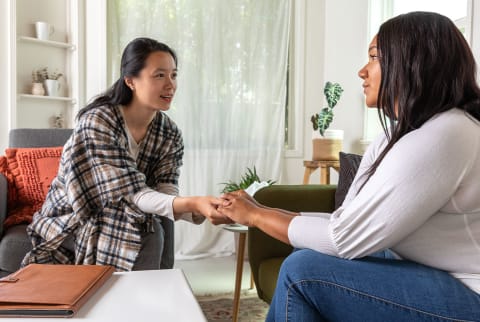Advertisement
Cultural Humility: How To Implement It In Your Health & Well-Being Practice


Anyone who seeks out a health and well-being provider is looking for someone who will be a part of their health care team. When they walk into a space where they are vulnerable and reliant upon care, they hope that the provider will be respectful and allow them to share their story without judgment. For this to be possible, the provider (or anyone, for that matter) should have cultural humility.
What is cultural humility?
Cultural humility is a process of communal reflection to examine the root causes of suffering, with the goal of creating a more inclusive worldview. It was originally developed by Melanie Tervalon, M.D., MPH, and Jann Murray-Garcia, M.D., MPH, to address health disparities and inequities in medicine and is further discussed by filmmaker Vivian Chavez in the video titled Cultural Humility: People, Principles, and Practices.
It's a multidimensional concept that includes self-reflection, critical self-thought, and lifelong learning. It also requires an awareness of power dynamics to ensure respectful partnerships and institutional accountability.
The work of making cultural humility integral to your well-being practice hinges on the idea that you, as the provider, are able to be self-aware while considering the alternative viewpoint of your patient or the person you are caring for.
How can well-being providers practice cultural humility?
As a well-being provider, you are in a position of power. To practice cultural humility, aim to be open and compassionate. Strive to provide individualized, unbiased, patient-centered care. Allow the person to tell you their story rather than labeling them based on preconceived notions.
It's also important to consider the lived experience of the person seeking care, as this is very valuable to cultural humility. In some cases, you'll need to be aware and sensitive to the historical significance of what it means to be on the outside of the dominant power structure. How has this affected your patient's access to treatment and care?
How do you hone and strengthen these skills?
It takes time, and that's OK. Structural racism and bias have resulted in bigotry, hatred, disregard, and disrespect. It will take time to unravel this, as well as to collectively heal.
1. Commit to unlearning.
Begin unpacking and unlearning what you know while being ready to take in new information. Seek out educators and teachers who are not replications of yourself. To learn something new, we all need to be comfortable taking a step outside of our bubble.
2. Engage in both formal and informal learning.
Not everything happens in a classroom, and we all learn differently. Seek out teacher trainings and continuing education opportunities where the leaders include people of color; people of different body shapes, sizes, and abilities; and people who identify as LGBTQIA+.
3. Diversify your life and work experiences.
Allow yourself to cultivate organic relationships with people outside of your cultural group. Consume art and music from a multitude of cultures. Expand your palate and taste foods outside of your normal routine. Read books written by authors from other cultures, not just the books that outline disparities but where people live their everyday lives and experience a range of emotions. Continually ask yourself to make space for alternative viewpoints.
Bottom line.
In this moment, many people are looking for ways to activate and move forward. It may be helpful to think on a small scale with sustainability and progression in mind. Begin with a course or workshop focused on self-reflection and how to ready oneself for learning. This work is messy and imperfect. It's rarely neatly completed. Embrace the uncomfortable moments, as you listen, learn, and assist.

Maya Feller, MS, RD, CDN is the founder of Maya Feller Nutrition, a private practice that specializes in nutrition for chronic disease prevention. Maya shares her approachable, food-based solutions with millions of people through regular speaking engagements and as a nutrition expert on Good Morning America.
Maya believes in providing nutrition education from an anti-bias patient-centered, culturally sensitive approach to help people make informed food choices. In her practice, Maya and her team provide medical nutrition therapy nutrition and nutrition coaching for the management of and risk reduction of non-communicable diseases from a lens of cultural humility. She is the author of Eating from Our Roots: 80 Healthy Home-Cooked Favorites from Cultures Around the World (goop Press), (January 24, 2023).
Maya lives in Brooklyn with her husband, two children, two cats, and two dogs!
More from the author:
Functional Nutrition Training
Check out Functional Nutrition Coaching
A cutting-edge nutrition deep dive taught by 20+ top health & wellness experts
Learn moreMore from the author:
Functional Nutrition Training
Check out Functional Nutrition Coaching
A cutting-edge nutrition deep dive taught by 20+ top health & wellness experts
Learn more
Maya Feller, MS, RD, CDN is the founder of Maya Feller Nutrition, a private practice that specializes in nutrition for chronic disease prevention. Maya shares her approachable, food-based solutions with millions of people through regular speaking engagements and as a nutrition expert on Good Morning America.
Maya believes in providing nutrition education from an anti-bias patient-centered, culturally sensitive approach to help people make informed food choices. In her practice, Maya and her team provide medical nutrition therapy nutrition and nutrition coaching for the management of and risk reduction of non-communicable diseases from a lens of cultural humility. She is the author of Eating from Our Roots: 80 Healthy Home-Cooked Favorites from Cultures Around the World (goop Press), (January 24, 2023).
Maya lives in Brooklyn with her husband, two children, two cats, and two dogs!

These 6 Simple Steps Will Make The Age Of Aquarius Your Best Era Yet
Perpetua Neo, DClinPsy

These 6 Simple Steps Will Make The Age Of Aquarius Your Best Era Yet
Perpetua Neo, DClinPsy

These 6 Simple Steps Will Make The Age Of Aquarius Your Best Era Yet
Perpetua Neo, DClinPsy

These 6 Simple Steps Will Make The Age Of Aquarius Your Best Era Yet
Perpetua Neo, DClinPsy









